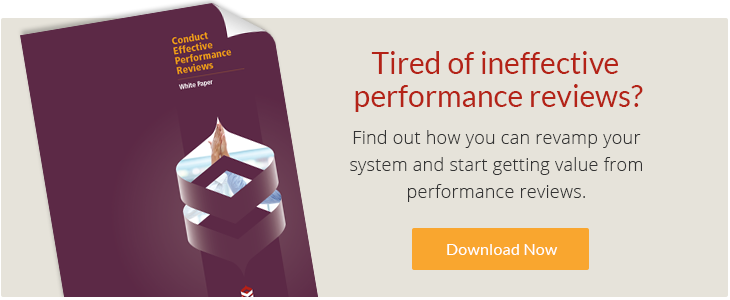Top 5 Performance Review Posts of 2015

2016 is almost here and that means it’s time to take a look at the best performance review posts of 2015. From compensation practices to employee performance, 360-reviews to learning systems integration, these are the articles that you clicked, read, and shared this year the most. They’re worth a revisit as you begin planning for 2016.
According to research at CEB, 77% of HR Executives believe performance reviews don’t accurately reflect employee contributions. Here are the articles you need to make big changes in your Performance Review Culture this year. Join us in looking back and then make your #ReviewResolutions!
1. Should Employee Performance be Judged on a Bell Curve?
This post delves into performance appraisals, the DO’s the DON’Ts and the sometimes flawed method of judging employee appraisals on a curve:
Despite the dissonance between old-school style ranking and the evolved workforce, in some cases, performance management hasn’t caught up yet. Flatter organizational structures and the growing desire for a collaborative workforce negate the effectiveness of the Bell Curve performance appraisal system.
The common practice of professional “grading on the Bell Curve” does little to improve employee performance. In fact, it does quite the opposite – employee performance (and happiness) plummets. So, to answer the question, “Should employee performance be judged on a Bell Curve?” the answer is no.
Take a peek at why professionals shouldn’t grade employee performance on a bell curve.
2.Why Performance Management Requires Leadership
The art of managing performance managers is one kneaded deep within the grains of organization, strategy and great focus:
You can’t have a performance management system without someone that oversees the everyday happenings around the office. However, just because the organization’s management has a hand in the performance of their employees doesn’t mean that’s where the buck stops. Organizational leadership has to be involved in the performance management system as well, as they ultimately dictate the performance culture of the organization. A leader is responsible for more than that. They must analyze the numbers, build a performance culture worthy of sustaining and create a plan for moving forward. Did you know that 56.3% leadership has begun to recognize the need to integrate their performance management and planned to do so in 2015?
Learn more about why performance management needs strong leadership.
3. Don’t Confuse Feedback with Attention in Performance Management
This post looks at the very real trend of quick feedback vs. real-time performance reviews. In this expose of feedback information, we delve into the world of millennials, and effective communication skills:
A lot of employees prefer feedback to real-time performance reviews. Primarily because their organizations don’t have performance reviews often enough to be considered effective. So with real-time feedback, employees are able to get the information they need about their work and then fix it as they move forward. However, sometimes this feedback translates into attention for supervisors as the crux of the feedback gets lost in trying to give it. Are you concerned your managers are confusing feedback with attention in your current performance management system? They aren’t the same thing and they produce different results.
In this post, Arringdale gives us a five-step approach to effectively communicating your performance expectations.
Tweet This: Take this time to realign your goals with these top performance management posts:
4. How Does Employee Engagement Affect Performance?
In this post we ask some burning questions about employee engagement and its relevance to the quality of work companies put out:
Most organizations are – at the very least – open to the idea of growth. However, if your employees are just shy of engaged at work, the company will be this close to getting that big new client. According to The Impact of Employee Engagement on Performance, a study by HBR, 71% of respondents agree that employee engagement is very important to the overall success of the organization.
While engagement does drive individual performance, it drives performance on a company-wide level as well. One strategy for organizational engagement isn’t a cure-all for every organization. It’s a delicate combination of company goals, values, culture and what drives the team. Since these are different with every organization, there’s not a one-size-fits-all solution.
From research to expert opinions, this post explores how employee engagement truly impacts an organization’s bottom line.
5. How Deloitte is Redesigning Performance Management
This post takes a hard look at Deloitte and its innovative performance management systems:
The performance management of your parents doesn’t work anymore. Changes in the structure of leadership and the influx of varying workforce generations don’t function the same way as they did 50 years ago. What used to be a system of reactive processes to address problems and employee concerns after it was too late, is beginning to develop into a forward-facing, proactive talent entity. Deloitte recognized the need for change and has initiated the redesign of traditional performance management to match the needs of the modern workplace. With the new age of organizational development, best practices have changed.
Deloitte did this simply by telling employees what the goals are. That’s it! In a world where only 57% of employees know their organization’s goals, this is a radical step. Learn how they implemented this across the organization, even during acquisitions and stormy economic conditions.
Tweet This: Only 57% of employees know their organization’s goals.
Read the full deconstruct of the redesign on Deloitte’s performance management processes.
Did you see your favorite performance management article listed here? What did you learn about performance reviews, employee productivity and learning integration in the workforce this year? If the answer is less than you hoped, join us for more in-depth looks at the processes, platforms and best practices surrounding performance management in the New Year! Don’t forget to join us on Twitter under the hashtag #reviewresolutions and tell us about your plans for 2016!

Other Related Posts You Can’t Miss:
